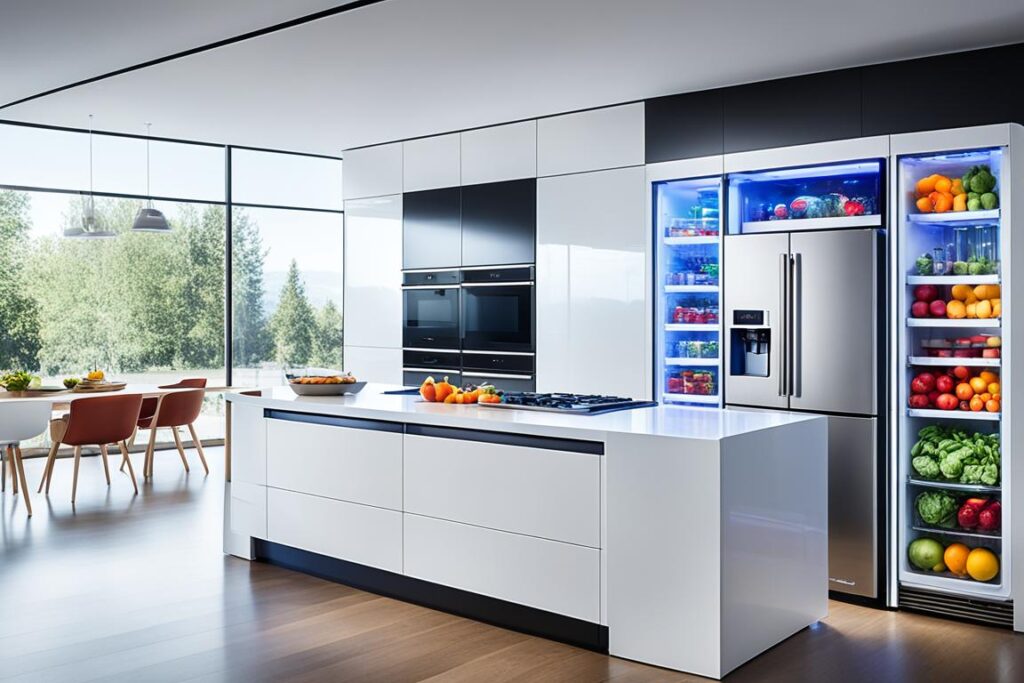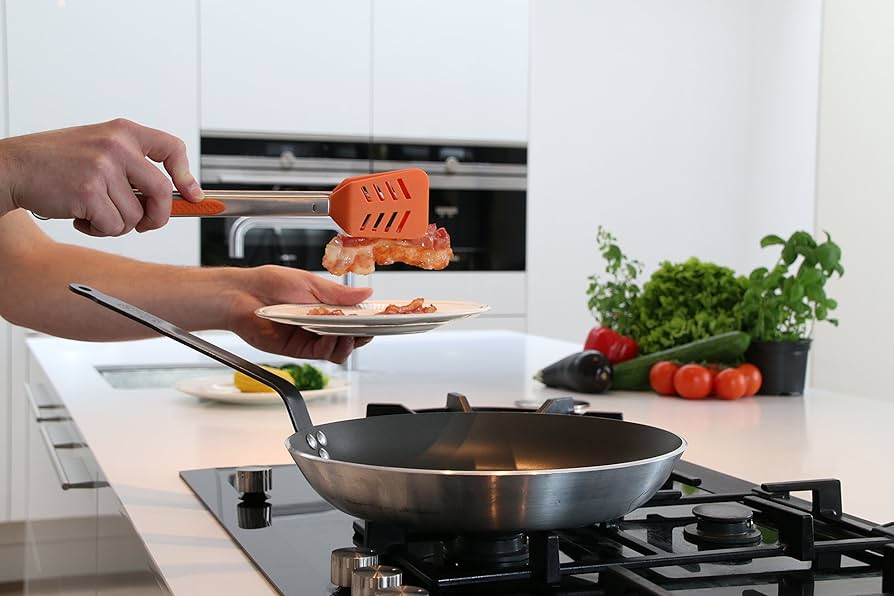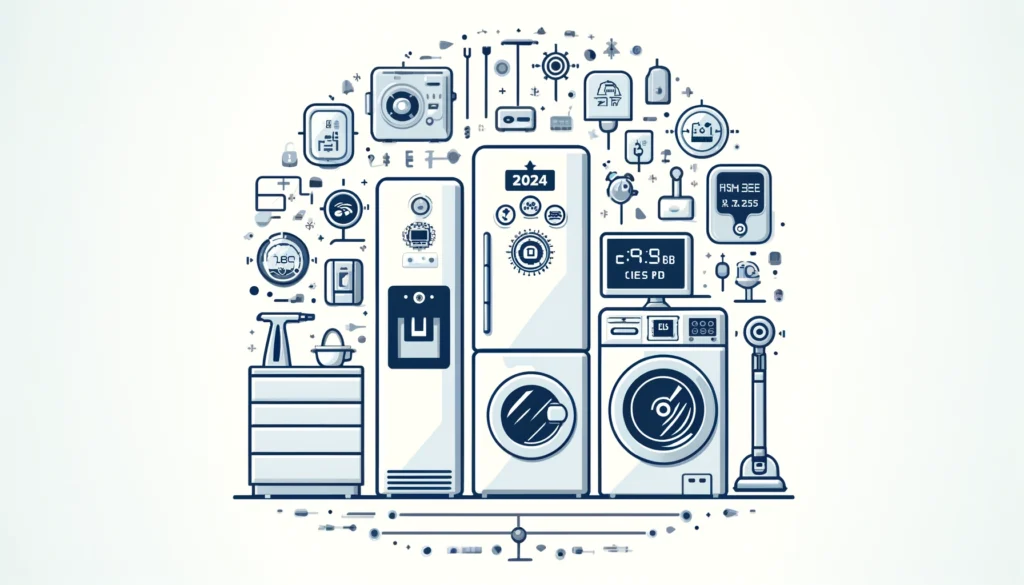Recent technological advancements have revolutionized our homes, making them smarter and more connected than ever before. Future Home Appliances have become an essential part of our daily lives, offering convenience, security, and energy efficiency. But what does the future hold for home appliances and smart home technology? Let’s take a look at the exciting innovations on the horizon.
Key Takeaways:
- The future of home appliances is centered around smart home technology.
- Smart home systems offer convenience, security, and energy efficiency.
- Technologies like IoT, AI, and machine learning are driving the evolution of smart homes.
- Smart home trends include wireless communication, smart security solutions, personalized health management, efficient heating, next-generation entertainment, advanced lighting, intelligent energy management, sustainable home technologies, and home robotics.
- The integration of these technologies will revolutionize daily living and create a harmonious tech-integrated environment.
Evolution of Smart Home Systems
Over the past decade, Smart Home Systems (SHS) have undergone a remarkable evolution, driven in large part by the integration of Internet of Things (IoT) technology. Through the utilization of wireless sensor networks, multiagent systems, image processing, and IoT, these systems have revolutionized the way we connect and control our home appliances.
One of the key advancements in SHS is the incorporation of artificial intelligence (AI) and machine learning (ML), which have greatly enhanced the user experience and opened up a wide range of new services. These services include personalized home comfort control, intrusion alerts, elderly care, and efficient appliance management.
Development of SHS has been influenced by a variety of technological approaches. Wireless sensor networks (WSN) enable seamless communication between devices, while multiagent systems (MAS) facilitate intelligent decision-making and coordination. Image processing (IP) technologies allow for advanced visual recognition and analysis. IoT serves as the underlying infrastructure that connects all smart home devices and systems. The integration of AI, ML, deep learning, neural networks, and fuzzy logic further enhances the capabilities of SHS.
These technological advancements have fueled the evolution of smart home systems, enabling personalized, efficient, and secure experiences. With SHS, homeowners can remotely monitor and control their appliances, ensuring convenience and peace of mind. IoT-based connectivity provides seamless integration and automation, optimizing energy consumption and enhancing overall home management.
Smart Home Systems have transformed the way we interact with our homes. Through the integration of IoT, AI, and machine learning, these systems have become intelligent partners, offering a range of services that enhance comfort, security, and convenience.
As SHS continue to evolve, we can expect even more exciting developments on the horizon. From voice-controlled assistants to self-learning systems, the future holds immense potential for smarter and more intuitive homes.
AI-driven Innovations for the Future
Recent advancements in AI have paved the way for groundbreaking innovations in smart home technology. AI-driven devices and algorithms can learn from user behavior and adapt to individual preferences, creating a truly personalized living experience. These innovations enable homes to become self-aware, anticipating the needs and preferences of occupants.
Additionally, the integration of AI with smart home systems extends beyond traditional household tasks. Smart healthcare devices can monitor vital signs and provide personalized health management, leading to improved well-being. Mind-controlled devices offer new possibilities for seamless interaction with smart home appliances.
“The future of smart homes lies in the integration of AI, which will enable homes to become not just smart, but truly intelligent. These self-learning and adaptive systems will redefine the way we live and interact with our surroundings.” – Dr. Lisa Johnson, AI Expert
Furthermore, advancements in AI will revolutionize home security, with intelligent door locks and sophisticated intrusion detection systems. With AI-powered audio and video interactivity, homes will become more immersive and engaging, offering enhanced entertainment experiences.
Technologies Driving the Evolution of Smart Home Systems
| Technology | Description |
|---|---|
| Wireless Sensor Networks (WSN) | Enables seamless communication between smart home devices |
| Multiagent Systems (MAS) | Facilitates intelligent decision-making and coordination |
| Image Processing (IP) | Allows for advanced visual recognition and analysis |
| Internet of Things (IoT) | Connects smart home devices and provides infrastructure for automation |
| Artificial Intelligence (AI) | Enhances user experience and enables personalized services |
| Machine Learning (ML) | Enables systems to learn and adapt based on user behavior |
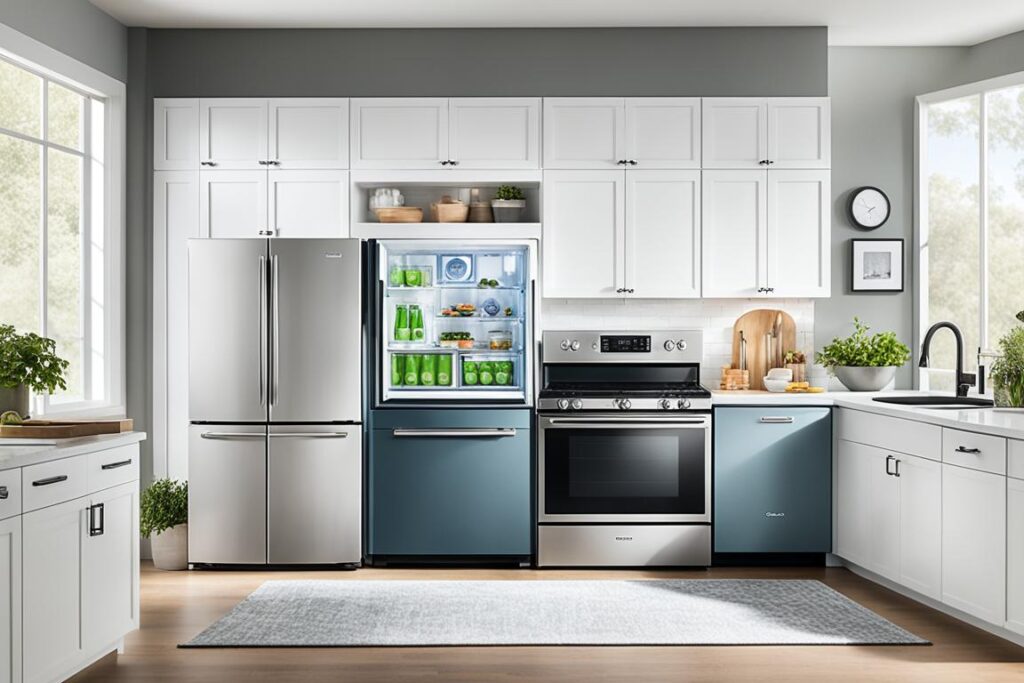
By harnessing the power of IoT, AI, and machine learning, smart home systems are continuously evolving, offering improved functionality and seamless integration. The future holds even more promise, as technology continues to advance and bring us closer to the vision of truly intelligent and self-aware homes.
Smart Home Trends and Tech Innovations
The smart home industry is experiencing rapid growth, driven by innovative trends and advancements in technology. These developments are reshaping the way we live, making our homes more convenient, secure, and efficient than ever before.
One of the key trends in smart homes is smart home connectivity, which relies on wireless communication technologies to seamlessly connect devices and enable intelligent control. This connectivity allows homeowners to control their appliances and systems remotely, enhancing convenience and flexibility.
Smart in-house security is another crucial trend, providing homeowners with peace of mind and protection. With the help of sensors and surveillance systems, smart homes can detect and prevent break-ins, ensuring the safety of both property and occupants.
Personalized health management is gaining traction in smart homes, offering individuals the ability to monitor their health and well-being from the comfort of their own homes. Health monitoring devices, sleep tech, and touchless solutions are just a few examples of how smart homes are empowering individuals to take control of their own health.
Efficient smart home heating is a top priority for homeowners looking to save energy and reduce costs. Smart thermostats and electric infrared heating systems provide personalized temperature control, optimizing energy usage and enhancing comfort.
Next generation entertainment is also revolutionizing the smart home experience. Advanced technologies, such as AI and AR-based furniture, reconfigurable materials, and immersive gaming systems, are transforming how we interact with our homes and entertainment devices.
When it comes to lighting, advanced lighting solutions are gaining popularity. These energy-efficient and customizable lighting systems offer a wide range of features, from color and brightness control to automated scheduling, creating the perfect ambiance for any occasion.
Intelligent energy management is another trend that is shaping the future of smart homes. These systems optimize energy consumption and storage, helping homeowners reduce their carbon footprint and save on energy bills.
Sustainability is a growing focus in the smart home industry, with sustainable home technologies being integrated into smart homes. These include renewable energy sources, such as solar panels and wind turbines, as well as rainwater harvesting systems, promoting environmentally-friendly practices.
Lastly, home robotics is becoming increasingly prevalent in smart homes. Robots are being designed to automate household tasks, from cleaning and organizing to assisting homeowners with daily activities. This technology is revolutionizing the way we interact with our homes, making everyday tasks more efficient and convenient.
These smart home trends and tech innovations demonstrate the rapid integration of technology into our homes, creating a dynamic and exciting smart home landscape. By embracing these advancements, homeowners can enjoy a more convenient, secure, and sustainable living environment.
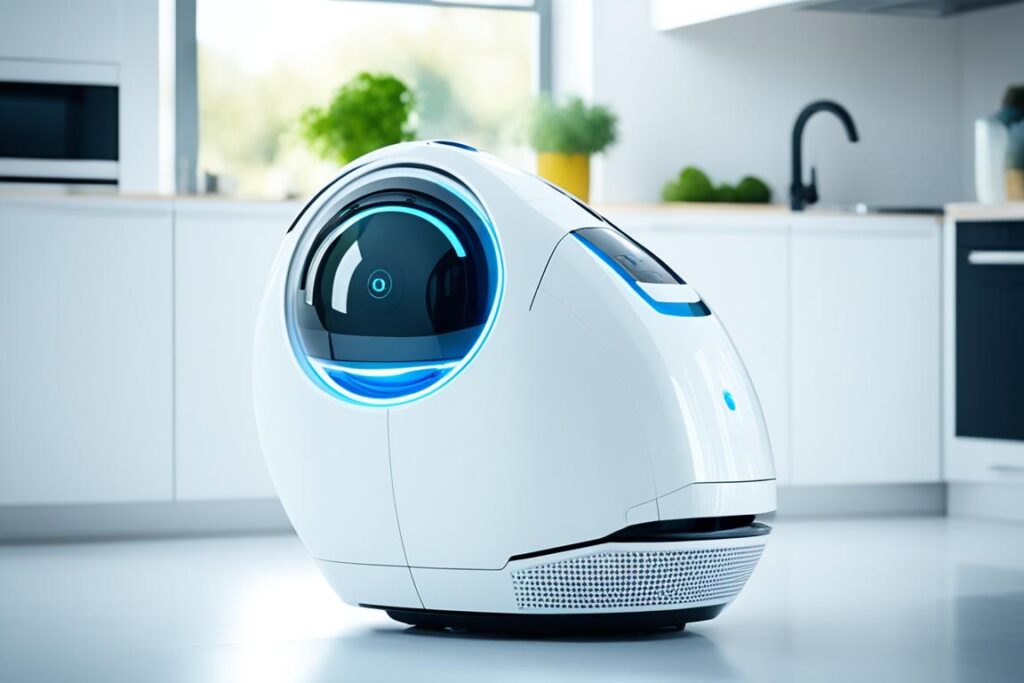
Smart Home Trends and Technologies
| Trend or Technology | Description |
|---|---|
| Smart Home Connectivity from Best Buy | Utilizes wireless communication technologies for seamless device control |
| Smart In-House Security from Amazon | Provides advanced security solutions using sensors and surveillance systems |
| Personalized Health Management | Enables health monitoring, sleep tech, and touchless solutions for individual well-being |
| Smart Home Heating | Offers efficient heating management with personalized temperature control |
| Next Generation Entertainment | Delivers immersive experiences with AI, AR-based furniture, and advanced gaming systems |
| Advanced Lighting | Provides energy-efficient and customizable lighting solutions |
| Intelligent Energy Management | Optimizes energy consumption and storage for a sustainable living |
| Sustainable Home Technologies | Integrates renewable energy and rainwater harvesting systems into homes |
| Home Robotics | Automates household tasks with the help of robotic technology |
Conclusion
The future of smart homes holds exciting possibilities. With AI integration and improved technology, the functionality and convenience of smart homes will reach new heights. AI assistants will automate tasks and provide personalized experiences, making our lives easier and more efficient.
One area that will see significant advancement is security systems. With better technology, smart homes will have more advanced security measures, recognizing individuals and preventing unauthorized access. This will give homeowners peace of mind and ensure their safety.
Audio and video interactivity will also become more prominent, enhancing remote work and entertainment experiences. Imagine controlling your home theater system with a simple voice command or having video conferences seamlessly integrated into your smart home setup.
New smart home devices will revolutionize our daily lives. From security camera drones and robot assistants to smarter lighting and self-aware homes, these innovations will make our homes more intelligent and responsive to our needs. Smart healthcare devices and mind-controlled devices will also transform the way we manage our health and interact with technology.
While some ideas may seem far-fetched, they represent the potential for a more advanced and seamless smart home future. As we embrace these technologies, it is crucial to use them responsibly and make the most of the extra time they provide. Let’s focus on nurturing relationships, increasing productivity, and contributing to society. The future of smart homes is in our hands.
Get you Smart Home Appliance – Best Buy, US Appliance, Sharp Electronics

